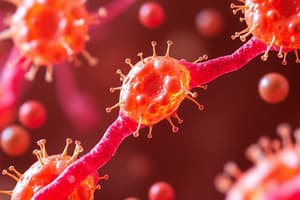Podcast
Questions and Answers
What is the primary focus of cell metabolism?
What is the primary focus of cell metabolism?
- The composition of cells, particularly the presence of macromolecules
- The exchange of signals and molecules between cells
- The sequence of events leading to cell growth, replication, and division
- The breakdown of nutrients for energy production, growth, and maintenance (correct)
How does the study of cell communication provide insight?
How does the study of cell communication provide insight?
- It helps understand how cells adapt to changing environments and respond to stress factors
- It provides a foundation for understanding cellular processes and developing targeted therapies
- It reveals how complex behaviors arise from the interactions between individual cells (correct)
- It sheds light on the structural and functional aspects of cells
What is the primary focus of the cell cycle?
What is the primary focus of the cell cycle?
- The sequence of events leading to cell growth, replication, and division (correct)
- The breakdown of nutrients for energy production, growth, and maintenance
- The exchange of signals and molecules between cells
- The composition of cells, particularly the presence of macromolecules
What is the primary focus of cell biochemistry?
What is the primary focus of cell biochemistry?
What is the primary focus of exploring cell composition?
What is the primary focus of exploring cell composition?
What is the primary benefit of expanding our knowledge of cell biology?
What is the primary benefit of expanding our knowledge of cell biology?
Which of the following is a primary distinguishing feature between prokaryotic and eukaryotic cells?
Which of the following is a primary distinguishing feature between prokaryotic and eukaryotic cells?
Which of the following is NOT a subdiscipline of cell biology?
Which of the following is NOT a subdiscipline of cell biology?
What is the primary function of cells in living organisms?
What is the primary function of cells in living organisms?
Which of the following cell types is found in bacteria?
Which of the following cell types is found in bacteria?
Which of the following is a membrane-bound organelle found in eukaryotic cells?
Which of the following is a membrane-bound organelle found in eukaryotic cells?
Which field of cell biology studies the chemical processes that occur within cells?
Which field of cell biology studies the chemical processes that occur within cells?
Flashcards are hidden until you start studying
Study Notes
Cell Biology: Understanding the Fundamentals of Life
Overview
In the realm of biology, cell biology stands as a crucial branch of study that delves deep into the intricate world of cells, the structural and functional units of all living organisms. Cell biology encompasses both prokaryotic and eukaryotic cells and explores their metabolic processes, communication mechanisms, and compositions. The study of cells is integral to our understanding of life, from the microscopic view of bacteria to the macroscopic perspective of human beings.
Prokaryotic Cells vs. Eukaryotic Cells
There are two primary categories of cells: prokaryotic and eukaryotic. Prokaryotic cells, such as bacteria, lack organelles surrounded by a membrane and do not have nuclei with inward-folding nuclear membranes. In contrast, eukaryotic cells, including those in animals, plants, fungi, and protists, possess nuclei and other membrane-bound organelles. While prokaryotes are typically simpler in structure and function, eukaryotes exhibit a wide range of complexity and organization, reflecting the diversity of life on Earth.
Subdisciplines of Cell Biology
Within the broader field of cell biology, there are numerous subtopics that researchers explore. These include cell metabolism, cell communication, cell cycle, biochemistry, and cell composition. Each of these areas provides valuable insights into the inner workings of cells and contributes to our collective understanding of life.
Cell Metabolism
Cell metabolism refers to the various biochemical transformations that occur within cells, involving the breakdown of nutrients for energy production, growth, and maintenance. Understanding cell metabolism is essential for studying how cells adapt to changing environments and respond to stress factors, as well as for developing strategies to combat diseases associated with defective cellular metabolism.
Cell Communication
Cell communication involves the exchange of signals and molecules between cells, enabling coordinated responses to external stimuli and ensuring the proper functioning of multicellular organisms. Studying cell communication provides insight into how complex behaviors arise from the interactions between individual cells, paving the way for novel approaches to treating diseases characterized by dysfunctional cell-to-cell signaling.
Cell Cycle and Biochemistry
The cell cycle is the sequence of events leading to cell growth, replication, and division. Understanding the cell cycle is paramount for comprehending the growth and reproduction of cells, which is critical for maintaining health and homeostasis. Additionally, cell biochemistry focuses on the chemical reactions and pathways occurring within cells, providing a foundation for understanding cellular processes and developing targeted therapies for various diseases.
Cell Composition
Exploring the composition of cells, particularly the presence of macromolecules such as proteins, carbohydrates, lipids, and nucleic acids, sheds light on the structural and functional aspects of cells. Investigating cell composition helps researchers understand how cells maintain their unique properties and supports the development of new technologies and treatments based on cellular components.
Embracing the Complexities of Cell Biology
As we unravel the mysteries of cell biology, we gain a deeper appreciation for the intricate web of life that surrounds us. From the simplest of cells to the most complex multicellular organisms, every facet of life is connected through the fundamental principles of cell biology. As research continues to expand our knowledge of cells, we open the door to countless possibilities for advancing our understanding of life and the world around us.
Studying That Suits You
Use AI to generate personalized quizzes and flashcards to suit your learning preferences.




